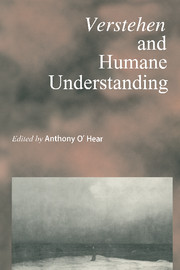Book contents
- Frontmatter
- Contents
- Notes on Contributors
- Preface
- ‘Two Cultures’ Revisited
- Rational and Other Animals
- Vico and Metaphysical Hermeneutics
- Three Major Originators of the Concept of Verstehen: Vico, Herder, and Schleiermacher
- Weber's Ideal Types as Models in the Social Sciences
- Verstehen, Holism and Facism
- Interpretation in History: Collingwood and Historical Understanding
- The Meaning of the Hermeneutic Tradition in Contemporary Philosophy
- Science and Psychology
- To Mental Illness via a Rhyme for the Eye
- Can There be an Epistemology of Moods?
- Feeling and Cognition
- Believing in order to Understand
- Data and Theory in Aesthetics: Philosophical Understanding and Misunderstanding
- Anti-Meaning as Ideology: The Case of Deconstruction
- Perictione in Colophon
- Index of Names
Weber's Ideal Types as Models in the Social Sciences
Published online by Cambridge University Press: 17 May 2010
- Frontmatter
- Contents
- Notes on Contributors
- Preface
- ‘Two Cultures’ Revisited
- Rational and Other Animals
- Vico and Metaphysical Hermeneutics
- Three Major Originators of the Concept of Verstehen: Vico, Herder, and Schleiermacher
- Weber's Ideal Types as Models in the Social Sciences
- Verstehen, Holism and Facism
- Interpretation in History: Collingwood and Historical Understanding
- The Meaning of the Hermeneutic Tradition in Contemporary Philosophy
- Science and Psychology
- To Mental Illness via a Rhyme for the Eye
- Can There be an Epistemology of Moods?
- Feeling and Cognition
- Believing in order to Understand
- Data and Theory in Aesthetics: Philosophical Understanding and Misunderstanding
- Anti-Meaning as Ideology: The Case of Deconstruction
- Perictione in Colophon
- Index of Names
Summary
There has recently been a great interest in models in the natural sciences. Models are used mainly for thier representational functions: they help to concretize certain relationships between parameters in studying physical systems. For instance, we might be interested in representing how the planets orbit around the sun—a scale model of the solar system is an ideal tool for achieving this end. We are free to leave out one or two planets or ignore the moons which many of the planets have. Alternatively, we might be interested in studying the relationship between two particular parameters—how one may be dependent on the other. Then we construct a functional model and determine the functional relationship between them. For instance, the orbital period of a planet is functionally dependent on the average distance of the planet from the sun. Models are rather widespread in the social sciences, expecially in economics where functional models are used to study relationships between, say, supply and demand. Economics, however, also uses a different kind of model which is also used in the natural sciences: the hypothetical or as if model. Economists employ as if constructions when they assume economic agents to be perfectly rational beings who always seek to maximize their utilities. It is common knowledge that economic agents are not perfectly rational and that the assumptions of perfect rationality and optimal information are at best idealizations which do not, strictly speaking, correspond to the economic reality of how economic agents behave in the market-place.
- Type
- Chapter
- Information
- Verstehen and Humane Understanding , pp. 73 - 94Publisher: Cambridge University PressPrint publication year: 1997
- 1
- Cited by



